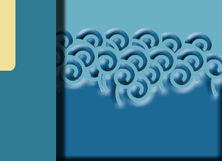




The bright colors and vibrant graphic design of this page are intended to evoke the attitude of Jamaica. I dedicate this page to the memory of my Mama, Beryl Brown. She
was a teacher for over 40 years from a family of teachers in Jamaica. Her joyful personality is also reflected in the colors of this graphic design. roots of reggae In the early 1950's, there was a great demand for American Rhythm and Blues music in Jamaica. Most Jamaicans could not afford the expensive albums from the U.S., but they could afford to go to outdoor parties. Some enterprising disc jockeys brought American music to the Jamaican masses via portable sound systems at these outdoor parties. When American R&B albums became scarce, a Jamaican version of R&B called Ska developed to fill the void. Ska was mainly instrumental and non-political. After Jamaica gained independence, Ska developed into a more political form of music called Reggae. reggae's birthplace
Trench Town, a slum which is part of Jamaica's capital Kingston, was the primary source of early Reggae. Early Reggae artists were well-known for their extra-legal activities (both by fans and the police) and were referred to as Rude Boys. These Rude Boys described the harshness of ghetto life in their songs (e.g. the Harder They Come by Jimmy Cliff) but offered no solutions to ghetto problems. A new religion, Rastafarianism, gave the Rude Boys more focus in their music and a possible way out of ghetto life. Devout Rastafarians worship Ras (Prince) Tafari as the reincarnated Black Christ. Ras Tafari was crowned Emperor Haile Selassie the First of Ethiopia in 1930. Rastafarians believe that Babylon (the western world) will be overthrown and that Haile Selassie will lead African people to a paradisiacal existence on Earth free of oppression. Devout Rastafarians do not believe that Haile Selassie died in 1975. Bob Marley and the Wailers
The political-religious influence of Rastafarianism caused Reggae Artists to focus on the historical experience of Africans both in Jamaica and outside. None did this better than Bob Marley, Peter Tosh and Bunny Wailer, also known as Bob Marley and the Wailers. Creative differences and desires for solo careers led Tosh and Wailer to leave the Wailers. Tosh produced more militant music (e.g. Downpresser Man) but Marley was better known for his mellow tunes (e.g. One Love). Wailer was mostly forgotten. After the death of Bob Marley and the assassination of Peter Tosh, Reggae started to take a less political tone. It became more sexual (sexist?) and fused with American Pop Music as the style called Dancehall. Bibliography * Encyclopædia Britannica Online (http://www.britannica.com/). Accessed June 9, 2001. Copyright © 2006-2020 by Kofi Garbrah. All Rights Reserved.
|


